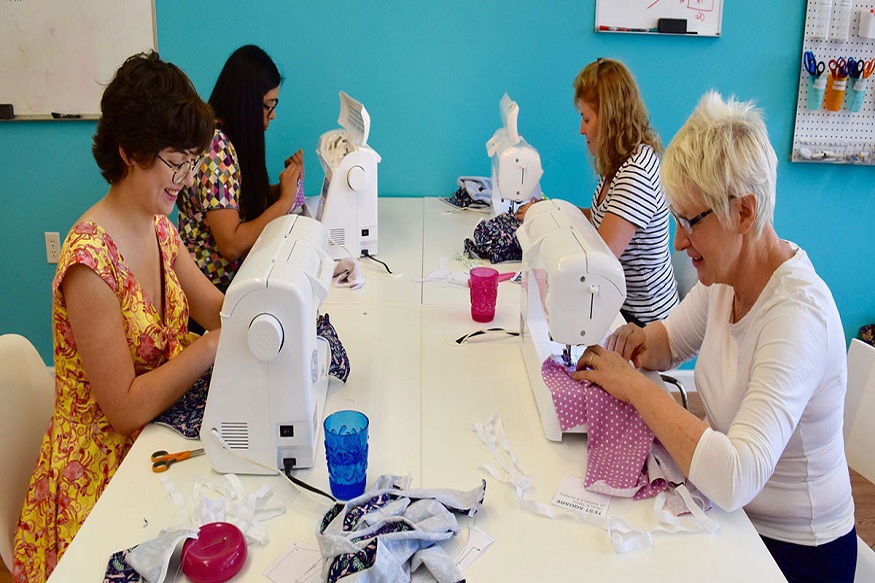In an age of fast fashion and online tutorials, it’s easy to assume that the humble sewing store might be losing relevance. But quite the opposite is happening. Across the country—and especially in places like New Jersey—sewing shops are experiencing a renaissance, not only as retail spaces but as vibrant community hubs for learning, sharing, and repairing.
These stores are no longer just a place to pick up thread or needles. They’re creative sanctuaries where people of all ages come to engage in meaningful work, build new skills, and connect with others who share a passion for craftsmanship. From classes to repairs and everything in between, today’s sewing shops are breathing life into local communities.
The Evolution of the Modern Sewing Store
Traditionally, sewing stores were practical places to purchase fabric, patterns, buttons, and notions. But with the growth of digital communities and DIY culture, many of these stores have evolved to meet new customer needs.
Today’s sewing store often offers:
- Group workshops for beginners and experienced sewists alike
- On-site machine repair and maintenance
- Open studio hours for community crafting
- Expert-led classes on quilting, embroidery, tailoring, and more
- Events featuring local artists, designers, and creators
These transformations are positioning sewing stores as multi-functional community centers, giving both hobbyists and professionals a place to gather, learn, and share.
Sewing Workshops: Building Skills and Friendships
One of the most significant ways sewing stores contribute to local culture is by offering hands-on workshops. Whether you’re learning to hem jeans or tackle your first quilt, there’s likely a class designed for you.
Benefits of Sewing Workshops Include:
- Skill-building in a supportive environment
Whether you’re 8 or 80, sewing is a life skill that can be mastered with the right guidance. Workshops provide real-time help and feedback that you just can’t get from a YouTube video. - Mental and emotional wellness
Many attendees report that sewing is therapeutic. The focus and rhythm of needle and thread can ease anxiety, spark creativity, and bring a sense of accomplishment. - Intergenerational learning
It’s not uncommon to find classes where grandparents sew alongside their grandchildren. This bridges generational gaps and preserves cultural traditions and knowledge. - New friendships
You’ll likely leave a sewing class not only with a handmade project but also with a few new friends. The shared joy of making something with your hands creates strong connections.
In communities like those across New Jersey, where creative industries and local pride thrive, sewing classes often reflect the spirit and values of the neighborhood they serve.
Repair Services: Fighting Waste and Preserving Value
Sewing stores are also combating the culture of disposability by offering affordable repair services. Torn hems, stuck zippers, or broken sewing machines don’t mean the end of a garment or tool anymore.
By encouraging repairs instead of replacements, these shops:
- Promote sustainable living
Repairing clothes keeps textiles out of landfills and reduces the demand for resource-heavy fashion manufacturing. - Save customers money
Rather than replacing an expensive piece of clothing, customers can extend its life affordably. - Support emotional connections
Whether it’s a favorite pair of jeans or a family heirloom quilt, repairs help preserve items of sentimental value.
This shift back toward mending over replacing is gaining popularity among eco-conscious communities. In fact, many sewing materials New Jersey stores now host “mend nights” where people can bring in clothes and learn basic repair skills alongside others.
Crafting Culture: A Movement Rooted in Creativity
More than just places to buy sewing materials in New Jersey, these stores are becoming hubs for cultural expression. They foster creativity through events like:
- Gallery nights showcasing textile art
- Community quilting projects for charities
- Design challenges with local schools and youth groups
- Sew-alongs with popular creators and local designers
In a world where digital interaction often replaces physical connection, these sewing stores are creating tactile, personal experiences. It’s about more than sewing—it’s about creating and participating in a shared culture.
Supporting Local: Why Shopping at a Sewing Store Matters
Choosing to shop at a local sewing store over a big-box retailer or online giant brings meaningful impact to the community:
1. Personal Guidance & Expertise
Need help choosing between interfacing weights or finding the right needle for a tricky fabric? Local store owners and staff offer unmatched knowledge, ensuring better project outcomes.
2. Higher-Quality Materials
Many local stores stock premium, sustainable fabrics and tools that are hard to find elsewhere. This supports better craft quality and longer-lasting results.
3. Keeping the Local Economy Thriving
Every purchase at a local shop helps keep the neighborhood vibrant, funds new classes, and supports staff who live in the community.
Especially in areas like New Jersey, which boasts a rich heritage of artisanship and small business culture, sewing stores play a vital economic and cultural role.
Fostering Inclusivity Through Fabric
Sewing stores are increasingly recognizing their power to create inclusive spaces. Stores are now:
- Offering adaptive sewing classes for differently-abled individuals
- Hosting LGBTQ+ crafting groups
- Providing low-cost materials and machines to underserved populations
- Partnering with immigrant communities to preserve textile traditions
These efforts make sewing stores welcoming and empowering spaces for people from all walks of life.
The Future: Tech Meets Tradition
As sewing makes its comeback, modern tools are merging with time-honored techniques. Sewing machines with programmable embroidery, 3D fabric printing, and design software are now part of many workshop offerings.
Forward-thinking sewing materials New Jersey shops are embracing this fusion by offering digital design classes, machine learning tutorials, and even virtual sewing bees.
By blending old-school values with modern tech, these stores are ensuring sewing stays relevant and exciting for future generations.
Stitching Communities One Thread at a Time
The revival of the sewing store as a community hub isn’t just a trend—it’s a response to the human need for connection, creativity, and sustainability. Whether you’re a beginner looking to sew your first button or a seasoned stitcher seeking new challenges, your local sewing shop offers a place to grow, learn, and belong.
Especially in craft-forward communities like New Jersey, where access to sewing materials is abundant, these spaces are not only keeping the art of sewing alive—they’re helping us all stitch closer together.

